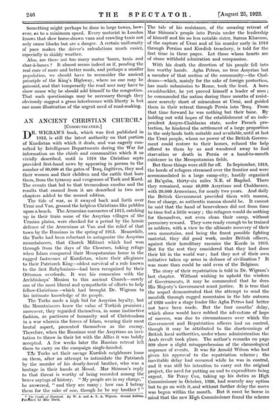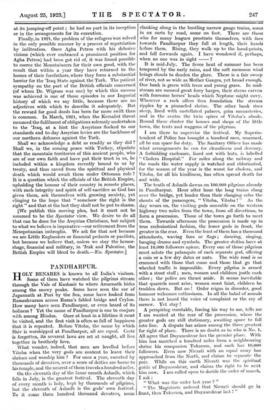AN ANCIENT CHRISTIAN CHURCH.*
[COMMUNICATED.]
DR. WIGRAM'S book, which was first published in 1913, is still the latest authority on that portion of Kurdistan with which it deals, and was eagerly con- sulted by . Intelligence Departments during the War for information on the chiefs and communities which it so vividly described, until in 1918 the Christian septs provided first-hand news by appearing in person to the number of 60,000 at the gates of 'Iraq, fugitives, they and their women and their children and the cattle that bore them, from the tyranny and vengeance of Turk and Kurd. The events that led to that tremendous exodus and the results that ensued from it are described in two new chapters added to the second edition.
The tide of war, as it swayed back and forth over Urmi and Van, ground the helpless Christians like pebbles upon a beach. The Armenian massacres of 1915, catching up in their train some of the Assyrian villages of the Urmian plains, were checked for a period by the heroic defence of the Armenians at Van and the relief of that town by the Russians in the spring of 1915. Meanwhile, the Turks had been reluctant to antagonize the Assyrian mountaineers, that Church Militant which had won through from the days of the Chosrocs, taking refuge when Islam conquered their Mesopotamian home in the rugged fastnesses of Kurdistan, where their allegiance to their Patriarch King—oldest survival of a rule known to the first Babylonians—had been recognized by their Ottoman overlords. It was his connexion with the Archbishops' Mission to this ancient Church—surely one of the most liberal and sympathetic of efforts to help fellow-Christians--which had brought Dr. Wigram to his intimate knowledge of its people.
The Turks made a high bid for Assyrian loyalty, but the Mountaineers knew the value of Turkish promises ; moreover, they regarded themselves, in some instinctive fashion, as partisans of humanity and of Christendom in a war wherein the forces of Islam, wearing their most brutal aspect, presented themselves as the enemy. Therefore, when the Russians sent the Assyrians an invi- tation to throw in their lot with the Allies it was boldly accepted. A few weeks later the Russian retreat left them to carry on the campaign single-handed.
Tile Turks set their savage Kurdish neighbours loose on them, after an attempt to intimidate the Patriarch by the murder of his dearly-loved brother, who was a hostage in their hands at Mosul. Mar Shimun's reply to that threat is worthy of being recorded among the brave sayings of history. "My people are in my charge," he answered, "and they are many ; how can I betray them for the sake of one, though he be my brother ? "
• The Cradle of Mankind. By W. A. and A. T. A, Wigram. Second Edition. Eubilobed by bilS3 Black, The tale of his resistance, of the amazing retreat of Mar Shimun's people into Persia under the leadership of himself and his no less notable sister, Surma Khanum, of the capture of Urmi and of his murder _early in 1918 through Persian and Kurdish treachery, is told for the first time in these pages. Let those whose hearts arc of stone withhold admiration and compassion.
With his death the direction of his people fell into less worthy hands. Agha Petros, no true Assyrian but a member of that section of the community—the Chal- deans—which, mainly for the sake of foreign protection, has made submission to Rome, took the• lead. A born swashbuckler, he yet proved himself a leader of men ; he commanded the nation during three months of resist- ance scarcely short of miraculous at Urmi, and guided them in their retreat through Persia into 'Iraq. From that time forward he was nothing but their bane. By holding out wild hopes of the establishment of an inde- pendent Assyro-Chaldaean state, under French pro- tection, he hindered the settlement of a large proportion in the onlylands both suitable and available, until at last the Urmi people, whom no power of the British Govern- ment could restore to their homes, refused the help offered to them by us and wandered away to find starvation or death in Persia or a hand-to-mouth existence in the Mesopotamian fields.
But these things were still far off. In September, 1918, the horde of refugees streamed over the frontier and were accommodated in a large camp-city, hastily organized at Ba'quba, thirty-six miles N.E. of Bagdad. There they remained, some 40,000 Assyrians and Chaldaeans, with 20,000 Armenians, for nearly two years. And daily the British Government provided them with manna, free of charge, as authentic manna should be. It cannot be said that the hand of benevolence did not from time to time feel a little weary ; the refugees would do nothing for themselves, not even clean their camp, without pecuniary reward. They were ready enough to be trained as soldiers, with a view to the ultimate recovery of their own mountains, and being the finest possible fighting material, they did good work, under British officers, against their hereditary enemies the Kurds in 1919. But for the rest they considered that they had done their bit in the world war ; had they not of their own initiative taken up arms in defence of civilization ? It was more than could be said even of the Belgians.
The story of their repatriation is told in Dr. Wigram's last chapter. Without wishing to uphold the -wisdom of Governments, it may be commented that he does His Majesty's Government scant justice. It is true that the sequel demonstrated that the attempt to send the menfolk through rugged mountains in the late autumn of 1920 under a stage leader like Agha Petros had better not have been made. But the four months' delay, which alone would have robbed the adventure of hope of success, was due to circumstances over which the Government and Repatriation officers had no control, though it may be attributed to the shortcomings of British local -authorities, under whose administration the Arab revolt took place. The author's remarks on page 399 show a slight misapprehension of the chronological sequence of events. It was Sir Arnold Wilson who had given his approval to the repatriation scheme ; the inevitable delay had occurred while he was in control, and it was still his intention to carry out the original project, the need for putting an end to expenditure being urgent. Sir Percy Cox, taking up his duties as High Commissioner in October, 1920, had scarcely any option but to go on with it, and without further delay the move was begun within the month. But it must be borne in mind that the new High Commissioner found the scheme at its jumping-off point ; he had no part in its inception or in the arrangements for its execution.
Finally, in 1921, the problem of the refugees 'was solved in the only possible manner by a process of repatriation by infiltration. Once Agha Petros with his delusive visions (which ever embraced a prominent position for Agha Petros) had been got rid of, it was found possible to coerce the Mountaineers for their own good, with the result that within a year they have returned to the homes of their forefathers, where they form a substantial barrier for the 'Iraq State against the Turk. The patient sympathy on the part of the British officials concerned (of whom Dr. Wigram was one) by which this success was achieved is one of those episodes in our Imperial history of which we say little, because there are no adjectives with which to describe it adequately. But the reward for good deeds has been far more swift than is common. In March, 1921, when the Kemalist threat menaced the fulfilment of obligations solemnly undertaken to the 'Iraq, at a hint the Assyrians flocked to our standards and to-day Assyrian levies are the backbone of our northern defences against the Turk.
Shall we acknowledge a debt as readily as they did ? Shall we, in the coming peace with Turkey, stipulate that the mountain territories of this ancient people, who are of our own faith and have put their trust in us, be included within a kingdom recently bound to us by treaty, and thus saved from the spiritual and physical death which would await them under Ottoman rule ? It is a question which the officials of the British Empire, upholding the honour of their country in remote places, with such integrity and spirit of self-sacrifice as God has given them, ask themselves with growing anxiety, yet clinging to the hope that "somehow the right is the right" and that at the last they shall not be put to shame.
[We publish this moving plea, but it must not be assumed to be the Spectator view. We desire to do all that can be done for the Assyrian Christians, but subject to what we believe is imperative—our retirement from the Mesopotamian imbroglio. We ask for that not because we are Little Englanders or financial pedants or pacifists, but because we believe that, unless we stay the hemor- rhage, financial and military, in 'Irak and Palestine, the British Empire will bleed to death.—ED. Spectator.]



































 Previous page
Previous page